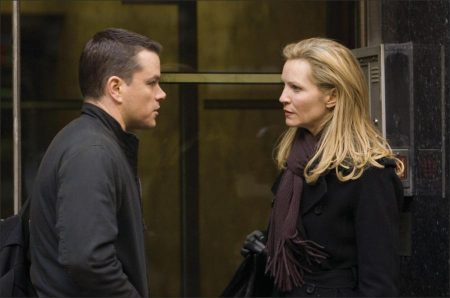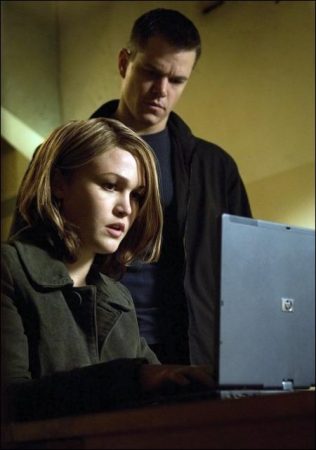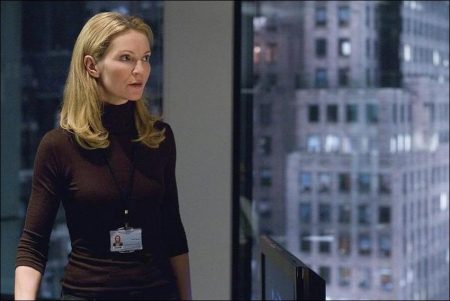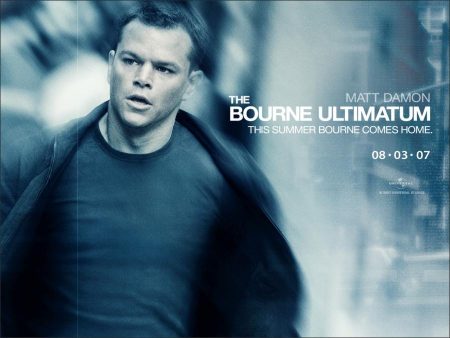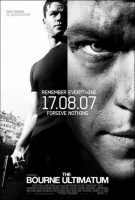Taglines: Remember everything. Forgive nothing.
The Bourne Ultimatum movie storyline. In 2002’s The Bourne Identity, he tried to discover who he was. In 2004’s The Bourne Supremacy, he exacted revenge for what was done to him. Now, he is coming home and has only these words for his pursuers: “I remember everything.”
Matt Damon returns as trained assassin Jason Bourne for the latest showdown in The Bourne Ultimatum. In the follow-up to The Bourne Identity and The Bourne Supremacy—the smash hits that have earned more than $500 million at the global box office and sold almost 20 million copies in North America alone since their debut in home entertainment — Academy Award-nominated Paul Greengrass (United 93, The Bourne Supremacy) again directs a breathtaking espionage thriller that allows moviegoers to crisscross the globe and follow one man as he stays a step ahead of his would-be assassins.
In the world of action choreography, chase sequences and intricate plot switchbacks, the Bourne series has set a new standard for an entire genre. With an innovative story structure that rewards fans who have followed the series and thrills those new to it, The Bourne Ultimatum explodes with twists and surprises. Capitalizing on the increasing stature of Damon and a cast of award-winning supporting talent in The Bourne Ultimatum, internationally lauded filmmaker Greengrass understands that audiences demand intelligent espionage stories complete with heart-wrenching emotion and mindboggling action.
The Bourne Ultimatum is a 2007 American-German action spy thriller film directed by Paul Greengrass loosely based on the novel of the same name by Robert Ludlum. The screenplay was written by Tony Gilroy, Scott Z. Burns and George Nolfi and based on a screen story of the novel by Gilroy. The Bourne Ultimatum is the third in the Jason Bourne film series, being preceded by The Bourne Identity (2002) and The Bourne Supremacy (2004). The fourth film, The Bourne Legacy, was released in August 2012, without the involvement of Damon, and the fifth film (a direct sequel to Ultimatum), Jason Bourne, was released in July 2016.
Matt Damon reprises his role as Ludlum’s signature character, former CIA assassin and psychogenic amnesiac Jason Bourne.[5] In the film, he continues his search for information about his past before he was part of Operation Treadstone and becomes a target of a similar assassin program.
The Bourne Ultimatum was produced by Universal Pictures and was released on August 3, 2007, in North America, where it grossed $69.3 million in its first weekend of release and was, at the time, Damon’s highest-grossing film with him as the lead. It went on to win all three of its nominations at the 80th Academy Awards: Best Film Editing, Best Sound Mixing and Best Sound Editing.
The Bourne Ultimatum earned $72,681,532 during its opening weekend at the box office, which at the time held the record for the highest grossing August opening for seven years, later overtaken by Guardians of the Galaxy in 2014. At the end of its theatrical release, the film grossed a total of $227,471,070 in the U.S. and $215,353,068 in foreign markets for a worldwide total of $442,824,138, making it the highest-grossing film in the series.
About the Story
We find Bourne living as a man without a country or a past. Subjected to brutal training he doesn’t remember by people he can’t identify, Bourne was turned into a sophisticated human weapon—the toughest target the CIA has ever tracked. Since he was discovered floating in the Mediterranean Sea off the coast of Italy several years ago, he has been on a desperate quest to learn who he is and discover who taught him how to kill.
After his lover, Marie, died from an assassin’s bullet, however, all Bourne wanted was revenge. Once he found it, what he craved was to disappear and forget the life stolen from him. But a front-page story in a London newspaper that speculates about his existence ends that hope, and he finds himself once again a target. Treadstone, the top-secret black-ops program that created this super-assassin, is now defunct. It has been reimagined as the joint Department of Defense program Blackbriar, with a new generation of trained killers—hidden from domestic or foreign oversight—at the government’s disposal. To them, Bourne is a $30-million malfunctioning threat who must be taken out, once and for all. To him, they are the only link to a life he has tried in vain to forget.
Bourne has reached the end of the line. This time, he will not stop at his former masters’ empty promises or even with the killing of those who relentlessly pursue him. With nothing left to lose, he will use each nuance of his training and every finely honed instinct they taught him to come after his creators and finish it all.
His quest will take him from Moscow, Paris and Madrid to London and Tangier— evading, outsmarting and outmaneuvering Blackbriar operatives, federal agents and local police every step of the way—in a desperate quest to find answers to questions that haunt him. And Bourne’s journey will ultimately lead him to where it all began and where it must come to an end: the streets of New York City.
Jason Bourne Comes Home: The Bourne Ultimatum Is Given
Over the past five years, audiences have eagerly followed Bourne’s perilous journey. When The Bourne Identity was released in 2002, moviegoers were enthralled by the film’s independent vision that put a distinct postmillennial spin on the action-spy genre. “What surprised people was how fresh the movie was,” comments producer Frank Marshall. “It wasn’t the action movie they expected. I think they expected a film that wasn’t as brave as the choices that were made—in the telling of the story, the way it was shot and how good Matt Damon was.”
To direct the second in the series, The Bourne Supremacy, the producers turned to Paul Greengrass, a British filmmaker who had garnered critical and audience raves for his documentary and feature films—such as the internationally acclaimed Bloody Sunday and Omagh. Though he was transitioning into big-budget filmmaking, Greengrass would retain his signature handheld cameras and style of lightning-quick edits while continuing the series’ storyline of one man against a clandestine government program. The Bourne Supremacy won a litany of raves from critics, with Peter Travers of Rolling Stone effusing, “If you’ve forgotten the kick you get from watching a globe-trotting, buttkicking, whiplash-paced action movie done with humor, style and smarts, take a ride with The Bourne Supremacy.”
Greengrass’ career exploded with the thriller and his follow-up work as writer/director of 2006’s United 93. The unflinching drama told the story of the passengers and crew, their families on the ground and the flight controllers who watched in dawning horror as United Airlines Flight 93 became the fourth hijacked plane on the day of the worst terrorist attacks on American soil: September 11, 2001. Greengrass’ efforts and the film would both be put on top-10 lists, and earn the director his first Academy Award nomination for Best Director.
Now, Greengrass brings the rogue hero back to find answers about who and what Bourne is—and who made him that way—in The Bourne Ultimatum. This need for closure is what made Greengrass want to return to the series. “Bourne is a real man in a real world in pursuit of a mythic quest,” he reflects. “What’s wonderful is that it’s an oppositional story. Is he a killer, or was he made to be a killer? There is an underlying feeling that Bourne is one of us, and he’s running away from ‘them.’ He’s trying to get the answers, and he doesn’t trust them. They’re all bad, and the system’s corrupted. To convey that with a sense of excitement in a very contemporary landscape is great fun.”
A Bourne sequel would not be complete without Oscar winner Matt Damon returning in the title role to join Greengrass. The actor was pleased with the director’s desire to helm the third in the series. “Paul is one of the great directors working today,” says Damon. “He’s a real storyteller whose style is perfect for these movies, because it’s not theatrical. He’s got a way of shooting that has a very honest feel to it.”
Damon again brings to the third production the quiet intensity and quest for truth he first infused into Bourne several years ago. “Matt’s unfailingly accurate,” returns Greengrass. “There’s something about him that makes audiences know he is a good guy. He’s a wonderful player of parts where the character is actually very dark. There’s a yearning in that character to be good that speaks to people, particularly young people. Matt and I have the same instincts for Bourne, the film and the franchise.”
Producer Marshall states that Damon offers the same qualities of the protagonist from Robert Ludlum’s classic spy novels. “Matt embodies exactly what Mr. Ludlum would have wanted in the character. For example, he doesn’t look like an assassin, even though he’s a trained one; he is contemporary and able to slip invisibly into the world. That’s the character Ludlum painted.”
In keeping with the other screenplays of the Bourne series, Tony Gilroy’s story for The Bourne Ultimatum diverges from the historical plotlines of Ludlum’s novels—written in the midst of a Cold War that would be almost unrecognizable to a generation born after its end. But Ludlum’s themes of conspiracy and government programs run amok remain compelling and universally relevant. The bestselling author was long suspected of having ties to someone inside the CIA—a contact who helped him maintain a high level of believability for his stories.
Like Ludlum, the film’s director has delved into the shadowy world of espionage. In 1987, Greengrass coauthored—with Peter Wright, the agency’s former assistant director—a personal account of a former MI5 secret-service operative. The British government’s attempts to ban “Spycatcher—The Candid Autobiography of a Senior Intelligence Officer” ensured its exposure and ultimate status as an international bestseller. Greengrass’ glimpse into the actual workings of the spy game gave him insight few other directors could have for Bourne’s story.
In earlier chapters, the assassin learned a limited amount about who he was, predominantly through an unusual set of instinctual skills—from how to silently kill a target in public to outsmarting anyone who crosses his path. But finding and losing his only love robbed him of the desire to use these tools. “Marie represented Bourne’s humanity,” says Damon. “He’s got a very dark past, and he’s done horrible things and he knows it. Marie helped him to understand some of what he did and what it means to be human. With her gone, he doesn’t have anything to lose.”
Bourne thought his past life was finished when a bullet killed rogue CIA agent Ward Abbott (Brian Cox) at the end of Supremacy. “Treadstone represents this group he never wants to have any contact with again,” Damon says. “He gave them an ultimatum at the end of Identity: He’ll come back with everything he’s got if he feels them behind him.”
But the need for global surveillance and the neutralization of threats to national interests has escalated in the minds of key CIA players, and in place of the Treadstone project has come Blackbriar. “They learned from their mistakes of agents having mental breakdowns, and they’ve upgraded training and behavior modification,” explains Damon.
Not only would high-tech surveillance and stunning action mark their return in the third of the series, but Greengrass was adamant that this episode would push the envelope in travel. Indeed, no Bourne film would be complete without a jarring race across the globe that takes moviegoers with Bourne to new locales—from London to Madrid and Tangier, from Paris to Moscow and New York City. “I wanted a contemporary landscape, and I liked the idea of uniting London, Madrid and New York,” offers Greengrass. “There are bits in Moscow and a big piece in Tangier. All Bourne films are not only quests, they’re journeys.”
Continue Reading and View the Theatrical Trailer
The Bourne Ultimatum (2007)
Directed by: Paul Greengrass
Starring: Matt Damon, Julia Stiles, Joan Allen, David Strathairn, Paddy Considine, Edgar Ramirez, Daniel Brühl, Corey Johnson, Lucy Liemann, Joey Ansah, Colin Stinton
Screenplay by: Tony Gilroy, Tom Stoppard
Production Design by: Peter Wenham
Cinematography by: Oliver Wood
Film Editing by: Christopher Rouse
Costume Design by: Shay Cunliffe
Set Decoration by: Tina Jones, Eliza Solesbury
Art Direction by: Robert Cowper, Alan Gilmore, Jason Knox-Johnston, Andy Nicholson
Music by: John Powell
MPAA Rating: PG-13 for violence and intense sequences of action.
Distributed by: Universal Pictures
Release Date: August 3, 2007
Views: 109
